#and I love conveying characters’ different personalities through speech
Text
You know there is one chapter in WBTL that I’m really excited to write and I have so many dialogue ideas/random phrases I find so good, I just decided to write them down because I’m worried I’ll forget them by the moment I’ll get to actually write the chapter. And you know what? This chapter is already 600+ words long.
#Was Born To Lead#THERE IS NO FREAKING DESCRIPTIONS IT’S LITERALLY JUST DIALOGUE LINES#IT LOOKS LIKE A FREAKING PLAY FOR NOW#And yet it’s so long already#Is it my curse I don’t understand it#Or do I just like writing characters talk hmm#I’m kinda taking this advice of writing stuff out of order#but if we’re being honest I’m actually just writing down phrases that have absolutely captured my mind recently#I replay them literally every day for like a week now#I think this is actually going to be one of the most emotional chapters in the entire fic#and for me possibly THE most emotional because it’s Valerio-centric and it’s really important to me on a personal level :P#Why else do you think I would constantly replay all those dialogues in my head slowly losing my mind :’D#Anyway I HOPE it’s going to be emotional or else I will burst into tears#But yeah I’m once again convinced I do love writing dialogues#and I think I even know the reason why#They’re just a lot easier than descriptions ajhdnfjjf#and I love conveying characters’ different personalities through speech#(and I have a fabulous sense of humor yeah#I’m just joking)#Anyway if this chapter ends up being longer than 10k words I’ll probably ignore the limit I set to myself XD#Yeah I have no writing mood at the moment#so instead of writing anything I’m just rambling about what’s going to happen like 10 chapters later#Ajhdndjfk but I hope I’ll come back to the writing mood someday because this story really gets more exciting with every next chapter#(this emotional Valerio chapter is called in my docs Chapter ? (becuase I don’t know the number yet XD) | The Last Choice#maybe I’ll give it a different title eventually though)#This is the updated concept of the history of the history man chapter :D#Oh my goodness it’s SO different from my original idea and I love it so much more#This is really a lot more emotional than it used to be#I love this man so much…
3 notes
·
View notes
Text
MPW: Segasaki & Yoh - Language Analysis Part 1
Subtitle Corrections: EP 1 || EP 2 || EP 3
My Personal Weatherman is a story about the relationship between Segasaki and Yoh, so rather than being introduced to the characters, we the audience are dropped right into the middle of their relationship, and the only way we learn about the characters as individuals is through the way they interact with each other, and how that contrasts with how they interact with the people around them.
The show does an incredible job of keeping the portrayal of their relationship consistent across the use of character design, wardrobe, lighting, cinematography, acting choice, directorial choices and of course language use. But not everyone who watches has equal access to that last one, so I try to be as detailed as possible in my subtitle corrections posts. I'm also a bit of a language nerd. Now, I want to get into their actual relationship, because I think there is a lot of information about how they feel towards each other that's just getting missed. Also I love them and this is how I spazz.
This post is the first of four in which I hope to show how the dynamic between Segasaki and Yoh is reflected in the way they speak - specifically, in the way they address each other, and the style shifting, or speech level shifts that they both demonstrate with each other, using scenes from Ep 1 - 3. I'll be using my own translations for this, some of which differ from the Eng subs. (Please bear with the nerdiness - I don't want to assume how much people know about Japanese)
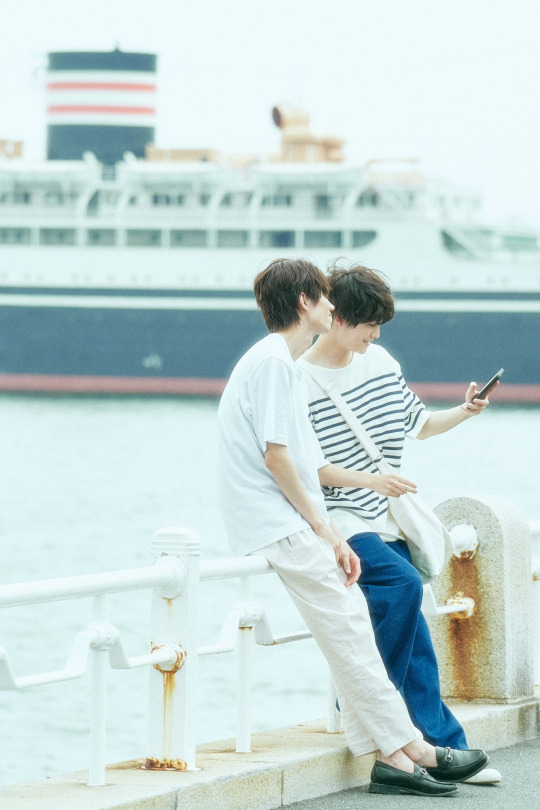
Prefacing this by saying that this language analysis is made specifically in the context of Segasaki and Yoh's relationship. There is a power imbalance here both in terms of social hierarchy (senpai/kouhai, age gap, successful/non-successful) as well as self-image (self-confident/self-conscious). Now, most of the time we see this manifested linguistically as the party with more social power using casual language forms, whilst the one with less power remains polite or formal. However, there is much more to human interaction than that, as we see in MPW where both Segasaki and Yoh shift in and out of Speech Styles often, depending on what they want to say and accomplish, as well as their emotional state.
1) Quick & Dirty Guide To Speech Styles/Formality Levels
Formality/Politeness is a spectrum and is expressed mostly through grammar and tone (sorry for the shitty word doc screencap):

1) desu/masu = formal/polite. Standard go to with the anyone you meet.
2) Generally speaking, the longer the sentence/the more syllables you hear, the more polite the sentence
3) The less direct you can be, the more polite you will sound
4) Word contractions (tsuzukereba -> tsuzukerya) = informal + impolite (but not always rude)
5) Slurred end vowels (iranai -> iranee) = informal + mostly rude, but not always (you just sound uncouth)
6) Most words have "formal", "informal" or even "rude" variations
7) CONTEXT DETERMINES EVERYTHING
Btw when I say "speaks roughly" or uses "rough speech", I mostly mean (4) + (5)
2) Speech Styles and Shifting Between Them
tl;dr
Japanese Speech Styles function like the verbal equivalent of personal space - the more formal/polite the level, the bigger the circle of personal space you maintain.
Shifts in speech styles indicate:
1) perceived changes in vertical and/or horizontal distance
2) the assumption of a position/role of the speaker in relation to the listener
3) changes in emotional state/the desire to convey emotion
4) the consideration of "polite company"
In this post we will look at examples of the first one - Vertical and Horizontal Distance.
Speech Styles: The Long Version (English Speaker POV)
Consider the way you speak if you were to say, give an important presentation in front of potential clients, versus the way you'd speak to an acquaintance you ran into on the street vs the way you'd speak to your closest friends. Different situations call for different ways of speaking - you're more likely to speak in full sentences and pronounce your words clearly for the first situation, and say "yes" instead of "yep" or "uh huh". You're also more likely to be blunt/direct with your friends than you are with clients - "You know ILU but do not under any circumstances buy that ugly ass shirt".
These context-dependent changes in speech patterns are similar to the changes in speech styles/formality levels in Japanese. Think of speech styles as the verbal equivalent of personal space. The more formal/polite the level, the bigger the circle of personal space you maintain. Dropping a level when you shouldn't is the verbal equivalent of invading someone's personal space and can make people uncomfortable and sometimes even angry. In Japan, the baseline "distance" with the average person is the way you would speak as if you were giving a presentation. Dropping to casual/informal speech might be tolerated (just like how you can tolerate someone sitting close to you and asking some questions, but it's uncomfortable), especially if you guys are around the same age, but dropping to "what's up bitcheees" when you should be at "hey how're you doing" basically tells the other person "I don't have even the basic level of respect for you".
In the same vein, the closer you are to someone, the more welcome you are in their personal space, and thus the lower the level of formality/politeness you'll keep with them. You trust that even if you speak bluntly, they'll understand you aren't trying to insult them. When and to what extent you drop a level is usually negotiated between individuals (either directly or indirectly). Once a level of casualness is established, your friends are going to look at you funny if you suddenly get all formal with them. They might even come ask if anything's wrong, or if you're angry at them or why you sound "cold". These shifts in speech levels therefore mark more than just the vertical distance between two people (ie, differences in social hierachy), they mark the horizontal distance (ie, how close people of the same "in-group" are to each other) too.
Having said that, there are times when you will shift to a more formal tone even with your friends or family - for example, when you're hosting a game at a large party and want to explain the game rules to everyone, you might enunciate your words better or keep the jokes to the minimum in order to convey the information is clearly and efficiently as possible. Similarly, if you've been appointed the leader in a group project and need people to pay attention and listen, you might change your tone of voice to command attention. In other words, when you assume a particular position, the way you speak changes too.
Finally, the way you speak to your friends/family in the presence of others (or "polite company", as they used to say) might also change - you might have no qualms cursing up a storm with your best buddy at the bar, but you might do your best to avoid being too vulgar when you're in front of their parents or your boss/university professor.
3) Segasaki and Yoh: Vertical & Horizontal Distance
Segasaki and Yoh are part of the same "in-group" in that they are in a relationship, so the horizontal distance between them is very small and before sunny days it's a negative distance - this is shown in how both Segasaki and Yoh use informal speech with each other (they generally omit the desu/masu forms aka use plain forms, and both use the informal pronoun "俺/ore" for "I" with each other).
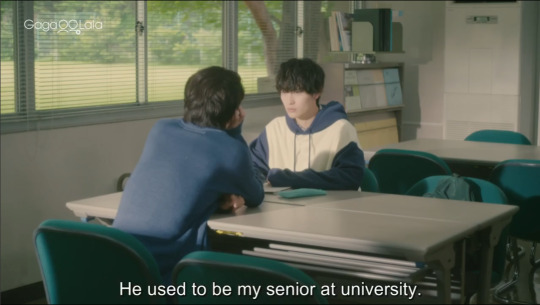
That said, there is also a hierarchy within that relationship (though their individual perceptions of that vertical distance differs) which stems not only from the nature of their living agreement, but also is likely to have carried over from their university days, when they shared a senior/junior relationship. Thus, generally speaking, Segasaki speaks quite roughly with Yoh whilst Yoh tends to use polite forms more often. Keep in mind however, that Japanese is a gendered language, and "rough speech" tends to be seen as a masculine speech pattern and can sometimes be normal between close male friends/family (otherwise, it is the verbal equivalent of getting up in someone's face and pushing them). The key here is that Yoh sticks to an informal, but more polite level than Segasaki does, and it is that difference that shows the power differential.
Horizontal Distance aka "We're Very Close"
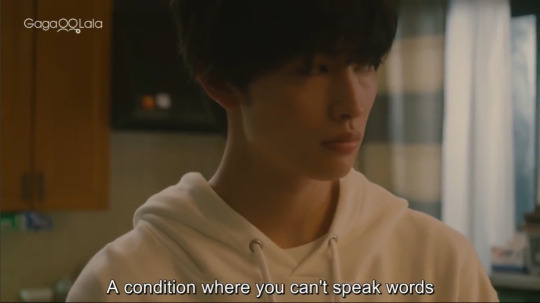
Despite Yoh's very valid complaint that Segasaki takes "man-of-few-words" to the next level (itself a liberty you'd only take with someone close to you), Segasaki only drops to rude forms in Ep 1 once:
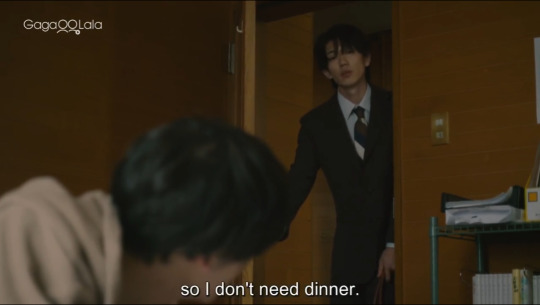
晩飯いらねぇ(banmeshi iranee) - slurred vowel
[literally - "dinner, not needed"]
Banmeshi is a more informal way of saying dinner (normal = yuu gohan).
Despite the slurred vowel, this sentence is not dismissive nor rude - it's what you'd expect between close friends/family.
In Ep 2 we hear Segasaki speak a lot more roughly to Yoh, as below, and of course during the almost-argument. But though his words are rough his intonation is often soft and he's quite tender with his touch. So, we can see that Segasaki isn't being disrespectful per se - he's not speaking roughly because he sees Yoh as beneath him in the social hierarchy - rather, he's demonstrating intimacy, familiarity and possessiveness, all at once. In fact, the more possessive he feels of Yoh, the more he drops his levels. As mentioned earlier, you only do this with people in your "in-group", with whom you know will understand you aren't insulting them.
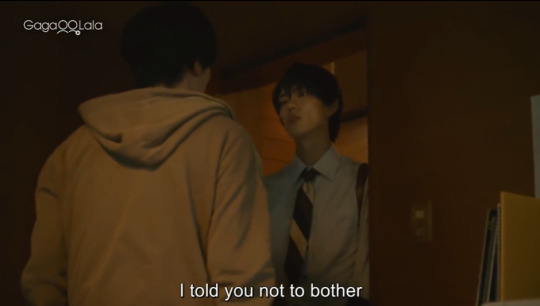
遅くなるからいらねぇっつっただろう
(osokunaru kara iranee ttsutta darou) - slurred vowel, word contraction, informal end particle
[I told you I wouldn't need it cause I'd be late right?]
Though somewhat in keeping with Segaski's curtness, this is still a pretty harsh sounding line - but note how Yoh doesn't seem offended or intimidated in the slightest - he understands that Segasaki is tired after a long day, and in return Segasaki softens his tone when he next asks "What did you make?"
Vertical Distance
It's easy to focus on Segasaki's use of rough, assertive langauge as an indicator of vertical distance, and I pointed out quite a few scenes in Ep 3 where he ends off what is essentially an order with assertive sentence-final particles. But focusing on this alone gives the mistaken impression that relationships with vertical distance go one way only - down - when in fact they are bidirectional. There is a mutual dependency between both parties, as we see clearly in MPW. Linguistically, this is portrayed through Yoh's choices to shift up a speech level.
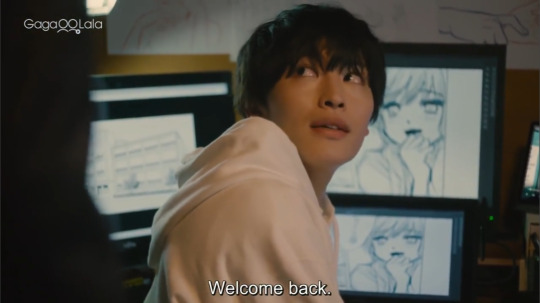
Just like how Segasaki is introduced to the audience through his proposal direct, informal and very forceful speech style, the first interaction we see Yoh have with Segasaki is a proper, standard greeting:
おかえりなさい
(okaerinasai)
[Welcome back]
Okaerinasai is the full, proper way to say this, but a more casual and common way to say this would simply be "okaeri".
See Ep 3 for discussion on standard greetings.
When Yoh thinks about Segasaki in his head, he often uses rough speech the same way Segasaki does, including the rude pronouns "aitsu/koitsu (that guy/this guy)", and yet when he speaks directly to Segasaki, he maintains an informal but still polite/neutral speech style. He rarely shifts down to rude forms, barely coming close even when drunk and emotional, but he does often switch up to a more polite level. In the above example, Yoh uses the full standard greeting in response to Segasaki's unspoken request:
俺、帰ってるんだけど
(ore, kaetterun dakedo)
[I've already come back, you know]
Ending with "dakedo" implies that speaker is going to follow up with something, usually a request or a question. In Japanese, this request/question is often left out, because the context given prior to "dakedo" is usually enough for the listener to fill in the gaps themselves. In this case, Segasaki might want a greeting or dinner, but at the very least, it's clear he wants Yoh's attention.
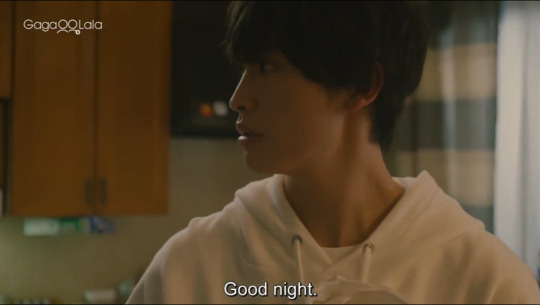
We know the standard greeting earlier was a style shift upwards because later in the episode, when Yoh says good night, he uses the casual version "oyasumi" instead of the full "oyasuminasai".
Even outside of standard phrases, Yoh's baseline is informal but not rude:
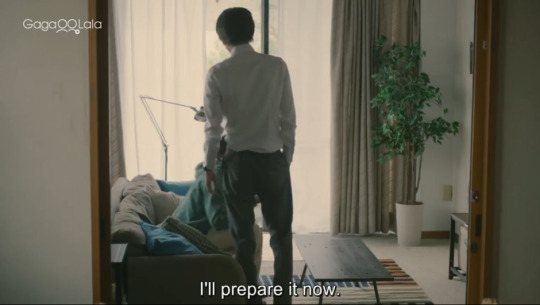
あ、いま準備する
(Ah, ima junbi suru) - plain form
[Ah, I'll prepare it now]
Probably the most telling is in Ep 3, when he's caught off guard whilst folding laundry.
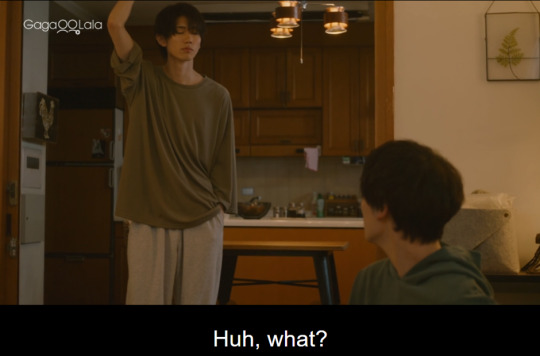
あ、なに?
(Ah, nani?) - plain form
[Oh! What?]
He answers Segasaki naturally, with just a word, as opposed to a proper “Hai/Yes?”, which he’s done sometimes when he’s unsure of himself, or if he's addressed directly.
So, we've established that Yoh’s baseline with Segasaki is informal but not rude - he feels comfortable enough with Segasaki to default to casual speech, but he acknowledges the power differential between them by simultaneously accepting Segasaki's rough speech as well as not dropping to it himself. This also tells us that the shifts up to formal/polite speech are deliberate and mean something. In EP 2, the shift demonstrated his insecurity surrounding his jealousy and their lack of physical affection, whereas in EP 3, he does it as a way to convey his gratitude.
In the next part, we'll look at how both Segasaki and Yoh use speech style shifts to convey emotion as well as to assume a particular position. Hope you enjoyed this!
#my personal weatherman#taikan yohou#体感予報#MPW language analysis#sociolinguistics#japanese language#mytranslations#MPW subtitle corrections#segasaki x yoh
152 notes
·
View notes
Text
Hc of Trolls being a Very Vocal Species
Just a personal hc I have of trolls making different insect like noises and how that affects their communication (+ some x reader hcs)
Characters: Chixie Roixmr, Polypa Goezee, Tyzias Entykk, Lanque Bombyx, Mallek Adalov, Marvus Xoloto
Masterlist
Disclaimer: do not copy, repost, take or feed to AI or NFTs anything I post
The longer you've spent on Alternia the more you learned about the hell murder planet and it's inhabitants
A thing that you can't believe you only noticed once you got yourself some quads filled was that trolls are a surprisingly vocal species
they're always somehow making some kind of noise to better express themselves
it's so common for them to do so that it even snuck into their speech patters, specially with your more chill friends since you discovered it's considered very informal to do so
Galehk once lent you a book to help you understand it better but to no avail, so you just went back to observing and sometimes asking your quads some questions
Through that you discovered that they found it weird that you were so quiet and thus very difficult to read during conversations
once you explained that humans just can't make some of those sounds they grew more understanding, but now you do make an effort to make some noises like clicking your tongue or sighing
you even told them the ultimate human secret of talking with your eyes and concealed facial expressions
Chixie, Polypa and Lanque taking it much quicker than Mallek and Marvus did
sometimes having whole conversations with you from across the room while your dear Skek Boy and busty clown were just lost
Mallek even getting a bit salty for not understanding you for shit
But it wasn't easy for you either, troll language wasn't one size fits all and each of your friends expressed themselves differently
Tyzias swears to you those are just different accents but you say it's their little special ways
Chixie Roixmr
She's very musical, usually putting them in her songs
her chirps resemble the ones from crickets, though much longer making her able to sing with them
Some of the songs she wrote for you are made only for chirps and purrs
even if you can't understand the lyrics you love them with all your heart
Strangely when Chixie is angered or any of you are in danger you hear a deep rattle noise coming from deep into her chest
it almost doesn't sound like her, the rattles make her sound much bigger than she is
usually making whoever is attacking her exitate giving her the change to either run or take them out
Also, when she rapped as The Mask this rattle frequently snuck into her performances
Polypa Goezee
Though very quiet, especially for a troll, once you gained her trust you saw how vocal she is
She purrs a lot, and I mean a lot
the loudest being while she tells you the plots of her favorite romance books, the purrs giving the tiniest distortion to her voice that's just the cutest thing in the universe
Buzzes and chirps when talking about things that can't be explained through words
and sometimes even with things that can be explained but she claims clicking just conveys it better
Strangely she doesn't growl or hiss, claiming that it would be unprofessional of her to do so
or maybe it's because she doesn't want to scare you
Considering her line of work and outer personality it would make sense, that is, only if you didn't know the real Polypa
Tyzias Entykk
Doesn't vocalize this way very often since it can become a bad habit and sneak on her while with a client
but on some extreme circumstances the most she will allow herself to do is growl at an attacker or click when she's almost passing out from exaustion
You drag her back to her coon as she melts to your touch , her clicks making you reminisce of a long forgotten memory of summer nights by the riverside, nature bringing the world alive among the darkness that surrounds you
Lanque Bombyx
Also very musical, will and did use this to flirt with you
Squeaks when frightened though he tries to hide it with his life
if you heard him squeak, no you didn't
Sometimes he'll let out these high pitched hums almost inaudible to you
this is a subtle way for Lanque to tell you how he feels without him actually needing to go through the embarrassment of doing so
Mallek Adalov
One of the most vocal trolls you've ever met
clicking and chirping while casually talking, even on the day you met
They're not shy about it and was one of the first trolls you noticed vocalizing like that
When lost in thought or upset that a code won't work for no apparent reason they click like a cicada
and you started associating this sound to spending the night laying at the sofa next to Mallek's table messing with your palmhusk as you wait for them to finish whatever they're doing
Their hisses and growls are kept only for situations that really call for it, none of them ever directed at you even during big arguments
thankfully you don't hear them too often but those are the moments you're remembered that trolls are in fact predators
it would seriously scare you if you saw anyone else doing it like Mallek
Their purrs on the other hand are for you and you only
Mallek purrs a lot and it vibrates their whole body
the purrs are just the perfect volume that you faintly hear when next to them but once you rest your head on Mallek's chest or under their chin you can hear them loud and clear
and you know those are the sounds of their love for you
Mallek will use said purrs to lull you to sleep on the regular
especially when you're sitting on their lap while they code
also voice warble,there's been multiple nights when you just play around with how Mallek's purrs modify both of your voices
Marvus Xoloto
A lot of clicks, almost being able to talk with only them
and Marvus has more than once tried to have whole conversations with poor clueless you this way
maybe as revenge for excluding him in your concealed facial expressions conversations
or maybe he's just doing it to pester you, who knows
You regularly see him talking to his lusus only with said clicks
The most musical of all and almost sings through his rasps and wrirrs
he uses them as his not-so-secret weapon during concerts making his fans go completely off the rails into a totally different mode of transportation
But off stage they sound so, so much different
the rasps that almost sound like growls and the wrirrs that are high pitched and sharp will soften once you're alone
almost like a lullaby just for you
though when Marvus is feeling silly he will sneak a honk in with them just to startle you awake
#hiveswap#troll headcanons#chixie roixmr x reader#polypa goezee x reader#tyzias entykk x reader#lanque bombyx x reader#mallek adalov x reader#marvus xoloto x reader
105 notes
·
View notes
Text
Gillion and Language!! :D (another jrwi hc ramble)
Personally, I really love the head-cannon of common being Gillion’s second language and therefore having a little struggle. (Primordial being his first language)
For example like, when Gillion was first pulled onto their old ship, he would’ve struggled a little with translating the words in his head. The crew would get into little miscommunications over it and he’d get frustrated with trying to adjust - among the additional discomfort of being out of water.
(I think that could also be the reason why he speaks so formally, unable to speak common as naturally as his co-captains. Though, I feel it’s also fitting to his character that the elders would have hammered formality into his speech.)
Gillion would have nobody to talk to with ease, except for Pretzel of course, the only person he’d assume would understand. It would that way for a while, until Jay would stumble upon his conversation and answer him in (somewhat) fluent Primordial.
I feel that’d be one of the things that’d bring them closer in their early days, teaching each other little words to help with understanding. Jay would enjoy the practise, not often being able to speak Primordial with anyone but the teachers who had taught her or long lost friends from Featherbrook. It’d help solve the barrier between them :)
With others it’s not so easy, which is why Gillion is so boisterous and expressive, trying to communicate another way. He and Chip find a way of understanding, learning slowly to read each-other’s expression or through physical signs. They show affection through side hugs or leaning into one another or wrapping an arm around the other’s shoulder. Actions sometimes convey more than words do.
When Gillion bonds with Caspian it would be a relief, rambling about home in the language he is familiar with. It’s nostalgic and comforting, especially after missing home and being forced to adjust to the change of culture so quickly. Even in the tank, everyone around him speaks in familiar sounds. It’s nice to hear words he can decipher without having to think too hard, the meanings coming to him with ease.
The same struggle comes to Edyn as well, speaking in broken sentences when they all meet in a bar in All-port. She spends most of her time working in the tank, so she still has a hard time adjusting and trying to respond to Chip and Jay as they talk to her. Gillion helps her out, his common improving over time spent on the Albatross. She still whispers to him in Primordial as the night goes on, and it brings him comfort that he isn’t alone.
Some of the Riptide crew would try and learn with time too. Gillion would teach Ollie little phrases to entertain him or tell him undersea stories. Chip would do his best to learn as much as he could; small languages lessons in-between sparring or training. He’d probably suck at it, laughed at by Jay for mixing up completely different words. The effort means a lot to Gillion at least.
Okay, this got out of hand. Goodnight! snooooree mimimmimi
Also, if you like this head-cannon you should read this fic that made me think about it :D (It’s an unfinished Royalty AU and it’s really awesome!)
#another deranged ramble for you you’re welcome#jrwi#jrwi riptide#just roll with it#gillion tidestrider#albatrio#language barrier#he also speaks Aquan actually!!#i love this guy so much#cultural differences#gillion jrwi
105 notes
·
View notes
Note
In my own writing I struggle with giving each character their own voice (speech patterns, phrases they use) and in Dialtown each character is super specific. Are there certain things you had to remember for each character, other than Oliver using his fucked up slang lmao.
When I write my characters, I can usually hear them in my head to some extent. Like, I can picture how it would feel to talk to them, or if I tuned out while one of my characters was chattering away about something, I can kinda hear the unintelligible static.
If you want me to write a lil essay pointing out differences in how the characters in the main cast are written, alright, I'll bite:
Verbal ticks help differentiate characters for me. We all know about Randy's stuttering, but there's more than just that in how the characters' sentence structures affect how we see their speech.
Karen's sentences tend to end in periods, if they aren't questions or if her voice isn't raised. Almost all of Randy's sentences, meanwhile, end with ellipses (…) or hyphens to indicate he trailed off/stuttered his way through the ending. Oliver does occasionally end sentences with ellipses or hyphens, but defaults to periods and often exclamation marks, as he's pretty excitable. This alone shows the difference in tone/confidence that the main 3 have without changing any words.
The characters all use slightly different terminology when they speak. Oliver's fucked up slang is only a part of it, he also uses theatrical language, often framing sentences creatively and in a way that absurdly beefs up the word count of his dialogue. He uses fairly atypical adjectives, surrealist language. He refers to himself in the third person sometimes. He uses imperfect tenses in order to make his sentences longer/less uniform. I'll give an example, from when Gingi asks Oliver if film reel movie projection is magic:
"I consider myself a sorcerer of FILTH, perhaps (an apt conjurer of muck/grime), but this artform isn't QUITE witchcraft NOR warlockery, I'm 'fraid."
Okay, putting aside the bizarre content of the sentence itself, one curious thing to note is that the whole sentence is full of words that don't convey any additional information. Conjurer is a synonym of sorcerer and he uses two synonyms for dirty AFTER already using filth. Guy loves theatrical language and will structure his sentence to make sentences much longer, so he can fit more of it in. But, then ends the sentence by taking a whole syllable away from the word 'afraid' and abbreviation it, like speaking with an accent. Oliver's sentence pacing is completely different to other people because of the volume of odd language he uses. In the context of the game, he's also drawing the player in by creating a pause, as the next line is:
"No, the actual "beaming" work comes from our dear old movie projector, and possibly my greatest love: Big Bertha!"
He likes Big Bertha and enjoys talking about her, and he tries to draw Gingi in and get Gingi invested in this thing by drawing out the introduction and forcing Gingi to wait for him to introduce Bertha in suspense. Randy volunteers info as if he thinks you're gonna hit him, unable to stand silence and hence, the sound of his own thoughts.
To contrast, Karen uses direct language, mainly. I wouldn't call her speech robotic, as most of the time she can retract language, she does (I am->I'm, I would->I'd, etc) but usually she uses direct tenses, and takes fewer words to say what she needs to compared to, say, Oliver. Generally, the words she uses tonally matches what she says. Weirder, less usual words come out when Karen is reacting to something she finds weird/illogical.
Norm's speech could be described as someone with a heavy accent who's well read, but is slightly insecure about being well-read. He uses words like 'y'all', 'ain't', 'reckon', retracts words like 'to' as 't'', but if you pay attention, he occasionally uses technical, academic language that doesn't match the aesthetics of the rest of his language. You can take the boy away from book learnin', but ya can't take the book learning outta the boy.
Billy is aggressive and generally, his language is designed to make the player feel bad in some way. Generally speaking, he's either insulting you, mocking your knowledge of the world, pointing out something you said as stupid, or is using words like 'lmayo'. Billy doesn't care much about the player, but is interested enough to talk to the player as a means to offend/demean them until you run out of things to say or leave, frustrated, which is Billy's goal. If you view what he says in this lens, you'll see this accurately describes how he speaks to you.
Billy uses surrealist language occasionally to seem more hellish and inhuman, but often, uses fewer words than other main characters. Subconsciously, it's to convey that Billy doesn't respect you enough to use more words. When Billy DOES use big words, it's exclusively on purpose and exclusively to subconsciously belittle Gingi, like when he refers to Gingi as a 'amphibian moron'.
God, similar to Billy, tends to use fewer words than most other characters. He often gives formulaic dialogue responses. There's no psychological play here, God just genuinely doesn't care how Gingi or anyone else sees him or if his tone/phrasing is improper because he knows how little respect people in Dialtown have for him anyway and embraces it.
Sometimes though, he does use uncommon synonyms for words, a byproduct of having lived so long through other times/eras. The references he makes are much the same. Fucker occasionally references ancient Greek figures and expects the references to land, as if everyone present somehow would've once somehow met these ancient fellows.
Mingus uses formal, impersonal language, and tends to use uncommon synonyms for words. The purpose of this is to subconsciously belittle the person she's speaking to and affirm her social class.
While she'll skirt past a commonly used word for a rare synonym in order to make her speech sound more dignified, she rarely leaves out pronouns in sentences. The reason for this is because most of her speech has an indignant tone. She's complaining about some shoddily done action or what she feels is a lack of service. So, the last thing she'd want to do is miss the opportunity to rant directly about her grievances in direct terms. Creative phrasing isn't used to replace pronouns but used to more elaborately phrase the error someone has committed to further emphasize her dismay. EG:
"You created the entire universe, and yet, the ability to perform a simple CARTWHEEL eludes you?"
Instead of saying "can", she says "the ability", instead of 'can't do', it's 'elude'. Hell, instead of 'do', it's 'perform'. But, both at the beginning and end of the sentence, she doesn't think to phrase the sentence in a way to avoid repeating the word 'you'. Like I said, the flourishes are just to drive the point home that she sees herself as above the person she's speaking to and to reaffirm how absurd she sees the limitations of others.
How Jerry talks is basically the conflict within a well educated but defeated man whose brain is decaying from years of substandard life. His speech, like his brain, is in conflict. His job dictates that he should always use terms of respect, like sir/ma'am, but he curses too. When he raises his voice, his sentences are often short and abrupt, but the words he uses tend to be elaborate and rarely used. Jerry is educated, has opinions on stuff. His mind is wasted at his job, and even through his defeated cynicism, you can subtly see that Jerry wants a better life through the words he uses.
Jerry's speech patterns are actually quite close to the narrator, and this is intentional, actually. The two characters share a few things in common that affect how they speak. Namely: Having to deal with Gingi's antics. There's almost a tired parental tone to both.
I could ramble for hours (please don't let me do this), but those are some examples of core character writing differences, namely in how I try to use language. Incorporating subtleties into the dialogue is good for separating characters and when you plan these out so that these placed differences are specific to traits that the characters have, your work'll feel more alive and be more satisfying to analyze later. Overthink. Overthink overthink overthink. It works, at least for me.
327 notes
·
View notes
Text
Not-a-tutorial - Dialogues: Part II
Part 2 of the not-tutorial about how Noctie does dialogues!
Some of you know this already, but I do the shooting part first, then write the dialogues to go with the pictures that I got. It works best for me that way. I always always ask myself: what does the character want to convey here? What is the essential message? Answering that question helps me stripping out all the redundancies and unnecessary bits that would bog down my meaning. Also, I tend to find that short bits of dialogue going back and forth between characters make for a more realistic and dynamic conversation.
Talking about realism, I like showing small hesitations in a character's speech. We don't always speak in one breath. We pause, we stammer, we look for the right words,... So I choose carefully where to split my lines, in order to make them as meaningful as possible and to have the most impact on the reader (hopefully).
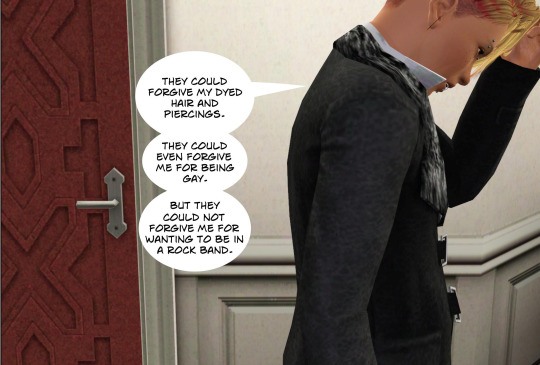

I use ellipsis (the three dots) to relay "visible silence". That is, when it is important to show that a character could talk but is very definitely not talking (either because they're holding back, or because they have too many thoughts at once, or the words don't come out, etc etc). I overuse those three dots, I just love meaningful silences.


I don't use any bubble at all for silences that are real silences (ie, the character is taken aback or is simply keeping quiet). It's more dramaaaaaatic that way!


Characters should ideally speak with different voices, but I know that's difficult to achieve. Besides some obvious extremes (I try not making my more cerebral characters speak the same way as the tougher, street-wise characters for example), I don't think I can get it right myself, mostly because English is not my native language and I don't master it well enough to be able to imitate a variety of accents and registers. So I try using other ways to individualize a character's way of talking, like speech mannerism or favorite expressions.
Erik's favorite swearword is very clearly "Goddammit". xD
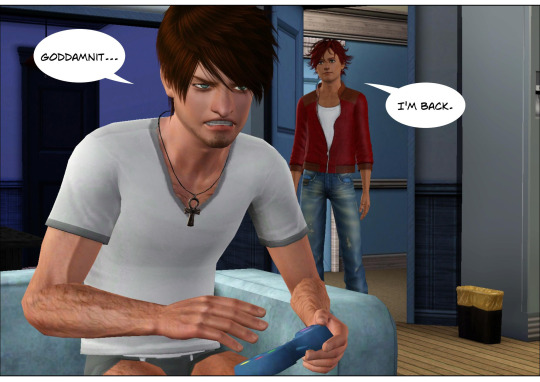



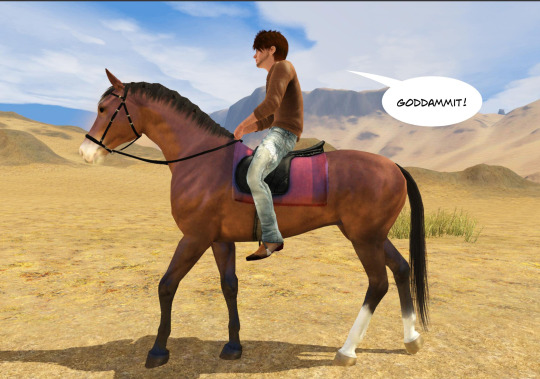
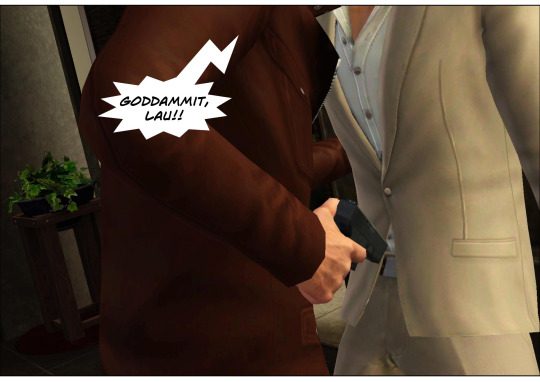
Romeo uses Italian when he's frustrated (mostly interjections) or when he wants to make a point.
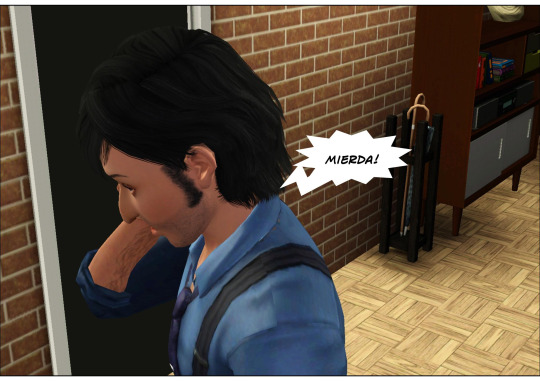



There are other easy ways to make a character's voice distinctive. Some will be quicker to crack a joke and others will have a stammer. Some will always be sulky, others will be particularly rude or polite. Their identity should somehow show through their way of speaking and addressing people.
Even if a graphic novel is very static, the way characters position themselves can say a lot about them too. The poses I select for each character can give an attentive reader some hints about their personality.
Again, I don't want to labor the point uselessly as everyone surely knows how to read a comic and I'm really not saying my way is the right way because it's not. I struggle a lot and I change my mind and try different things and there are a million things that I just don't do right. This speech bubble sort-of-guide is probably way too specific to be useful to anyone, and again, I don't believe I have enough expertise to pretend I know what I'm doing. I just really like the topic so consider it a ramble!
Thank you for reading this far! Hopefully that was at least interesting!
28 notes
·
View notes
Note
Eden you are my Webtoons mutual so I must know if you have been reading Like Wind On A Dry Branch because I need someone to scream to me about Killian and Rieta
!!!!! HI MARIA! Yes I do indeed read Like Wind On A Dry Branch and have in fact been doing so since day 1! (They got me with the sweeping cloaks and the courtly speech I must admit.) I think I said some time ago that I love that it's kind of like this portrait of somebody who has been so shattered in virtually every aspect of her life that she has become even less than dead inside, and how it's the story of her slowly blinking awake again and coming back to life.
It's been some time since I've read the beginning of the comic-- honestly this ask might be the perfect reason for me to go back and reread it all- but one thing I've truly loved and appreciated about the art style/form is that we as an audience can see how Rieta's eyes slowly strengthen and clear over time, and how gradually life and color have returned to her face. I just found that to be such a boon of the medium, since through the written word you can only convey so much of that, but I love that you can slowly see her making more expressions and looking more intently and consciously at things than she did before. It's just!!! so sweet to me because it reminds me of the Persuasion 1995 factoid where it was shot in chronological order to show the change in Anne's mien over time. She gets to come into her self and that's so loving to me!!
I will also say that for me, it is fully one of the best written stories running on the platform right now- I'm honestly astonished by how much care and attention has been poured into its story and world and characters; which is not to bash the other surrounding comics but sometimes I really read comics more for the love of art + quick doses of story than for story depth which if I miss it I can find if I read a book instead! But it's kind of shocked me with how...like...not in a rush it is. The story threads for what happened to both Rieta and Killian have clearly been presented to us as an audience from the beginning, and yet it clearly goes over the facts of those events over and over from a variety of different views, and as a lover of a gradual story I adore that! As a whole, it seems very even-keeled and very caring towards its characters, and I have so much respect for that.
Also, to tag along with the things that have shocked me with how much I like in it, I honestly adore how much gravity and sincerity they have towards the immortality of people's souls. This is probably definitely due to my lenses on that want to see everything diffused with the light of my faith, but I LOVE how the most recent arc has treated Kilian's relationship with his mother. As is the case with a lot of fantasy these days, I have to kind of approach it with a forgiving mindset that there's a cultural worldview now that our souls just kind of disappear, but (SPOILERS LOL feel free to press J to skip this post) the fact that so much of Killian's guilt and heartache as a person has been based around the fact that he was so, so frightened of having hurt his mother's soul when she was resurrected against her will, and also that he firmly believes that a soul shouldn't be tied to this world forever and ever but should pass on when their time is come...is one of my weirdly most comforting takes on fantasy necromancy that I've read in a series in quite some time.
(I also just read Sabriel recently for the first time and I think that compounded on how hard this particular revelation of Killian's hit me, just in the sense that like, the dead are full of people who love us and they want us to live whilst we have the time to do so, and then they want us to walk forward and that's full of love too, it's just personally very meaningful to me this year what can I say.)
I know you sent this ask specifically about Killian and Rieta, but to be honest with you I love them so dearly I don't have quite the words to express it!!! They're just something so true and deep and rooted that I can't quite comprehend but I love how everything about them has turned out. Quite frankly their dynamic is one of my favorite examples of restraint being used in fiction at the moment and I have so much love in my heart for how slowly the pace has gone for them as a pair because somehow....that makes it seem all the more real to me and I'm glad for it. The two of them remind me of that one quote (maybe by Chesterton? I can't quite remember but very him energy) that says when a couple are paired together they knock on the door to eternity; there's a great deal of inherent gravity to them as a pair because from the get-go, Killian in particular has approached Rieta as an equal and a human being and eventually as his dearest friend in the world, things I think romance in general could really benefit from as a genre. I also really, really appreciate that he's a fairly grounded person with a normal amount of self-assurance expected of a grown man, but not so much that he ever causes her unnecessary pain, in fact he's so conscious of her and her well-being that even a mother could not be more nurturing him imo.
Which I guess leads me to my next point, which is I think what really makes the series shine, what makes them make sense and what has honestly kind of shocked me most about the story as a whole is, well, Killian himself. I'm a great lover of fantasy in general, and I come to that from a standpoint of loving coming of age stories which fantasy as a genre is rife with, and I'm happy with that because I love them!! but I think what really draws me to this story so much over and over again is that it has these main characters who are really at the height of their powers as is, however locked away they might be at the beginning, and so there's less of a sense of watching the two of them being put through the crucible of their lives to find out who they are, and is in fact more of a story of finding out who you are when you are happy and settled into yourself when you have been constantly traumatized your entire life beforehand and aren't acquainted with who you can be when you're finally okay.
I say that because I think the both of them have already been cut as close to the core as a person can be-- Rieta obviously with her husband and her child, and Killian with his mother; but what I love so much about them is that it turns neither of them harsh or cruel. Rieta's agony of course being the more wide-spreading of the two causes her to retreat into herself, but what astonished me is that that never happens with Killian. He reminds me of the archetype of characters like Bruce Wayne or Jane Eyre, people who have all the reason in the world to have a broken heart who simply...don't. Many another (particularly male) character have used their personal tragedies as excuses to make the whole world suffer as they have, but his whole work has always been to make sure that because he has experienced true loss, no one else under his protection ever will if he can possibly help it. He's a truly kingly man, whose life is entirely based around safeguarding his people, nurturing the talents of those who would otherwise be turned away, making a place where children can grow to their full stature without the harried aspects of the court life he had, and that's so much to me. He's entirely more loving and caring and warm-hearted than I ever expected picking up the series, and he's FUNNY, he laughs and he finds good in his friends and his domain, and when he is tested or attacked his brain is always trying to figure out how best to protect his people from harm. And I hate to say that that is such a surprise to me but it is! I love that he's written that way-- because truly, there is nothing more kingly in a person than the warmth and kindliness of their heart, and he has that in spades.
tldr: yes I love them thank you for asking and letting me have the chance to wax poetic about them!!! 💛💛💛
#long post#ask#friends tag#wheeeee i'm sorry for how long this is but it turned out i had more to say than i thought i did!!
16 notes
·
View notes
Text
The politics of "Never Let Me Go"
What prompted me to finally watch the series “Never Let Me Go” was seeing a specific scene from the series. It’s the scene on the beach, where Nuengdiao is yelling at Palm about them being from different classes, different societies etc. This caught my attention as something that could have some aspect of political commentary. I didn’t expect it, but I hoped for it. Especially as I kept on seeing opportunities for this commentary to occur while watching the show.
Disclaimer: I know that this show utilises a lot of lakorn tropes and isn’t necessarily meant as political commentary, but I still feel that it is relevant to investigate the politics of the media that we consume. Also, I don’t understand Thai and therefore do not have knowledge on the actual meaning of subtitles I’ve quoted or much knowledge on the culture.
To go back to the beach scene that I just mentioned; I was baffled to actually watch the context of it. When I first saw it on social media, I thought it would have been a sad speech made in a time of hardship, especially for Nuengdiao. Actually watching it, however, it was a moment where Palm made the slightest rejection of Nuengdiao, pushing him away whilst he was grieving the death of his mother. This was the first time Palm had in any way been disrespectful to Nuengdiao and it was in every way justified given the context. However, this grasp for control in their relationship was entirely rejected by Nuengdiao and what had previously seemed to me as a heartfelt speech was suddenly not only an immature and disproportionate temper tantrum, but an attempt at oppressing Palm even further. Know your place. Although Nuengdiao never says it and frequently tries to convey the opposite, the message shines clearly through much of the show: If you’re poor, know your place. If you’re rich you can do whatever. This is especially illustrated in the contrast not only between Nuengdiao and Palm, but also between Palm and Phum, the bully. Nuengdiao, as I’m sure we are all aware, has a bit of a temper and is frequently controlled by his emotions. This is contrasted by Palm, who is very controlled and can even be described as obedient in most situations. As I just mentioned, whenever Palm tries to break away from this obedience, he is immediately knocked down by either an emotional story from his father or a bunch of mean-spirited yelling from Nuengdiao.
Nuengdiao is being empathised with by the show. An example of this is when Palm has a conversation with the woman who cooks Nuengdiao’s breakfast and Palm mentions that the amount of food being cooked is exaggerated. We might initially think that this is because Nuengdiao is spoiled, but when Palm goes to speak with him, he complains that the cook insists on cooking too much food for him. After this, Palm’s father is the one to say that Palm shouldn’t eat with Nuengdiao, not Nuengdiao himself. The inequality between Nuengdiao and the workers is therefore blamed on the working class more so than on Nuengdiao, Nuengdiao’s parents or the economic system. Palm is also sympathised with, but I would argue that this is only because of his forementioned obedience. Palm is an empathetic character because he respects the wealthy and is willing to sacrifice himself for their well-being. When he is not keeping an eye on Nuengdiao’s alcohol consumption at a party, he is punished. A similar situation is when Palm pushes Nuengdiao at the beach. Palm lacks the self respect to ever really hold Nuengdiao accountable for his actions, which I feel bleeds into the opinion of the overall show. He also falls in love with Nuengdiao very quickly and gets a tattoo of his name after them having been together for maybe a few weeks, at most a few months. I think it’s supposed to be romantic, but in reality it’s really just bad writing. For the most part Palm plays the part of the Good Poor Person and when he doesn’t, he’s put in his place. The Bad Poor Person contrasting Palm is Phum (although I’m not entirely sure he’s poor since he’s at the school and he has the money to pay for the outing video, but I think that his experience with his dad and his anti-capitalist politics code him as poor or at least not wealthy). Phum is a character that, like Nuengdiao, is very controlled by his emotions. He starts bullying Nuengdiao when Nuengdiao’s mother’s new decisions at the family company affect his family’s (and others’) finances so much that his father attempts suicide. This is obviously a deeply traumatising thing to experience for a young man and whilst the bullying is not justified, it makes sense that he would do some of the bullying that he starts out with, e.g. putting the “cheater” graffiti and flyers on Nuengdiao’s locker and stealing the necklace that is connected to Nuengdiao’s father and Nuengdiao’s position in the company. The outing, which is arguably the worst thing he does, doesn’t happen until after he is confronted about the bullying in episode 3. This confrontation scene is complicated because Phum is not in the right here, but neither is Nuengdiao, although he is portrayed as a saint for only asking for his necklace back. Phum explains his reasons for the bullying and the very sensitive information that his father tried to kill himself because of what Nuengdiao’s parents did, yet Nuengdiao shows no regret, sympathy, self-reflection or apologeticness. I’ll say it again: Phum was not right in his aggressive manner of handling the situation, but Nuengdiao’s continuous lack of sympathy for the lives of people less fortunate than him is similarly despicable although it is not portrayed as such. When confronted about the bullying, Phum also says that he’s doing it because of Nuengdiao’s “capitalist parents” (EP 3). I think this illustrates that the villains of the show are people who do not respect Nuengdiao’s family’s authority. Anti-capitalists are necessarily the villains of the series because our protagonist and hero is the heir of one of the biggest capitalist companies in this fictional version of Thailand. The heroes are cheating, evicting and causing people so much financial insecurity that they attempt suicide. Of course anti-capitalists, leftists and poor people would function as the villains in this scenario.
Similarly to the Good and Bad Poor Person, the show also has Good and Bad Capitalists. Nuengdiao and Chopper are the Good Capitalists. Nuengdiao finally does something about the protests in EP11, where he goes to the poor people at the market. He is met by banners with messages such as “the market belongs to everyone” and “give the land back to us.” He doesn’t give the land to them, but he does announce that he is going to let them keep using it. We never see their reactions to this. Nuengdiao also stops a casino from being built at the hotel because it is illegal and interestingly mentions in EP11 that illegal business is already taking place at his company, but that he is going to end it. Once again, the morality of his parents, who most likely implemented this illegal business, is never questioned. The show even has themes of having to choose between what is right and one’s parents with Chopper and his father, but the show never dares to extend this questioning onto Nuengdiao and his parents. Chopper is also a Good Capitalist because he makes his own money through stocks and other supposedly fair methods and he keeps saying to his father that he wants to make his own money. The villain of the show (his father) points out to him that it’s not very easy to make your own money, which is true although it obviously doesn’t mean that what he is doing is right. We never really see anyone struggling with money, except the villains (and a flashback of Palm’s father) because the Good Poor People are loyal to their employers and don’t expect anything more than what they get. Chopper’s father is the villain because he is disloyal to Nuengdiao’s family and wants to cheat his way to something that isn’t rightfully his. It is rightfully Nuengdiao’s because… well, it’s his birthright.
Honestly, I found that "Never Let Me Go" is quite poorly written and the use of lakorn tropes might have been what led to the questionable politics of the show as well as the fact that Nuengdiao’s father originally was supposed to be a mafia boss (or so I’ve heard). In many ways I think "Never Let Me Go" contrasts "Not Me" with its complete lack of class consciousness and self reflection for our main character, which is unfortunate because it could have had such interesting political commentary. If only the writers had been willing to give their characters - both pro- and antagonists - some more depth.
#gee this was a long one#never let me go#never let me go the series#not me#not me the series#politics in thai bl#jojo tichakorn#politics#politics in media#my post#thai bl#thai bl analysis#analysis
2 notes
·
View notes
Text
my thoughts on star trek: nemesis
SPOILERS UNDER THE CUT
:(
i knew data was going to die but i still wasn't happy about seeing it. it's funny i was thinking to myself "how can they kill him in a permanent way? he'll probably have to explode" and. well he surely did.
let's put that to the side for the moment. in terms of the movie itself, it definitely had high stakes, it didn't feel like an episode of tng the way the 1st and 3rd movies did. obviously destroying all of earth vs one colony of people are higher stakes but i also mean in terms of the pacing, the music, the mood, etc. i found tom hardy.......sort of interesting? i had to adjust to both his voice and looks since i've never seen him look like a bald twink and speak with anything other than a gruff voice so that took a lot of adjusting lol. but his character would interest me at times and bore me at others. i liked his line "you won't live to see the echo defeat the voice" and at the end when he purposefully pulled the sword or whatever further through his body so he could look picard in the eye as he died. but then he would do boring villain stuff or sexually assault troi and i would be like ok what are we doing here.
also really? fucking sexually assaulting troi AGAIN?! tng writers get a job stay away from her. literally any time a non-cast member man is near her i feel fear. and i know they tried to do the whole her taking back her power thing with the mind connection to the viceroy but girl it is not the serve you thought it was. however i can't deny i loved seeing her in the classic trek/noir "light over the eyes" i'm shocked they haven't done it for her sooner since she has the black betazoid eyes. but anyway that shit pissed me off.
other than that troi scene pretty much anyone who isn't picard or data is irrelevant to this movie. you could replace worf with a regular security agent and almost nothing would change, beverly could just be any doctor and riker is mostly relevant to the few scenes with troi, which as we've discussed i don't like. i did enjoy seeing their wedding at the beginning and i liked picard's speech, but seeing them get married reminded me of how quickly they got back together in insurrection and then i got mad again lol. society if i had the time to rewrite their plot in insurrection for a fic. but that's besides the point.
i can't really think of anything else to talk about other than data's death. like i mentioned i knew he was going to die in this but i didn't know how or why, however early on in the film it was easy to figure out that he was going to sacrifice himself. it's a little odd that the movie was like here have his stupider younger brother as a glimmer of hope or something even though data himself is like yeah that guy isn't me even if he has my memories. so what was the point of that?
i think the part of data's death that made me the saddest was when riker comes back to the bridge and troi runs over and embraces him. you see geordi look at them with this smile but it's full of sadness, and then his face falls and he looks back at the explosion debris. why did they linger on that. i could literally feel geordi thinking that the person he wanted to be with forever just got fucking exploded. it was so clearly that emotion and i don't know what they were trying to convey otherwise but they failed. literally they should have filmed geordi kissing the android just once like they deserved it!
also side note so funny how they finally completely gave up on the emotion chip. no mention of it and data makes a comment on having no emotions. they could have said oh he left it behind so b-4 can have it but they didn't even do that. goes to show how stupid of an idea it was.
[edit: oh my god who is going to take care of spot. i just thought of that and got so sad. i guess b-4 could and spot might not be able to tell the difference but that android is not equipped to take care of an animal i don't think. WHO TAKES CARE OF SPOT. if this is ever answered please let me know.]
but that's that i suppose! overall i think i like the tos movies more than the tng ones, at least the first four compared to these four. the tng movies are definitely better than the last two tos movies. they might be better movies overall just from a technical standpoint but i think the tos movies are more rewatchable. i think the only tng movie i would rewatch is first contact, and even then i have no active desire to at the moment. however not every trek movie can be the search for spock so i have to be realistic. it is crazy to think there are no trek movies left for me to watch since i've seen the aos movies already. i liked having them for me at the end of the show, so it'll be sad whenever i finish ds9 and there will be no movies for me to watch. they added a gravitas to their original shows that made everything feel fuller and dynamic, and elevated it beyond what the tv format ever could. i think the first tng movie is the best example of this, i loved seeing the tng set through a movie. but, that's that!
3 notes
·
View notes
Note
Writing ask games are so fun!!
Dialogue or description? Why is the other one so hard?
I was JUST talking to a friend about this! Do you have a preference for narrative versus summary styles? Is either more challenging than the other?
Thank youuuu 🥰🥰🥰🙇🏼♀️ & 🤝I agree they are fun (+ maybe capable of shaking something loose 😅)
Although coming in hot with the hard question/s I see! 😅😄
Okay: dialogue vs description... I'm not sure I have a preference?! I like writing both, and I think both are challenging, especially to do well/succinctly.
And... ~it depends!! I find writing dialogue pretty fun generally, but if I'm writing Beth & rio speaking to each other my face gets grumpy & lots of stuff ends up crossed through bc I tend to violently dislike it when they speak (🤯🤯🤯) & also they're so taciturn, nonsensical, insane etc.
And description! I mean what even is that! Of settings, of ppl, of outfits, of how ppl are speaking (eg volume, pitch, facial expressions & movements etc)...? It's a huge topic to lump together as a preference no, and not to be that guy (just kidding! I love to be that guy!) there's no reason dialogue couldn't be descriptive eg 'what did the man look like?' '18ft tall with 7 feet and bright purple scales'.
So first of all: kinda false dichotomy maybe? But most of all: deffo false dichotomy, in that I think the really hard bit is knitting them together! Just back and forth dialogue btwn (espec only 2 characters, particularly of different genders so you can rely on pronouns as identification) isn't so hard, and neither is finding ways to describe whatever needs describing: and even if the latter doesn't come super naturally, I think if you can identify what needs more detail to bring it to life, that's a workable challenge. The heavvvvy difficulty is tying them together dynamically, & unforcedly!
~conversations (I'd say beyond only dialogue, bc there could be unspoken communication via say eye contact, body language, movement etc) can be a great way to pepper in descriptive texture (eg of the environment, the objects characters are interacting with, the characters & their physical responses) but it's a fine balancing act!
Typically when I'm reading a conversation, I want to know what the other person says next in response!! I don't always want a lot of superfluous detail abt where their fingers are dallying!! That can take the reader out of the rhythm of the dialogue! If there's a paragraph of motion and detailed description btwn each spoken line and/or relevant gesture, I might simply forget what the heck they're responding to by the time we get there!!
So I think ^structure & rhythm/pace (as well as what pov it's filtered through) become v important. If it's a "dialogue" scene btwn oh let's say 2 v taciturn annoying insane etc chars where actually only about 3 lines of speech are exchanged, having a lot of additional descriptive texture can help. If the responses are being eked out, then a lot of glaring & gesturing & looking away at other stuff indeed makes sense to be happening & makes sense that it would be noticed by the pov character. Whereas if it's a rapid fire screaming match, too much detail & motion can slow the scene down, be distracting for the reader & easily seem unrealistic for the pov character (eg why are they staring at the actions of each individual finger when it was established a moment ago they were glaring into another character's eyes? How are they taking in & enumerating micromovements when they're established to be apoplectic with rage & incapable of focus?).
I'm trying to type up a ragged paper first draft atm, and what I've been struck by for the dialogue + description sections is:
too many dialogue tags! In order to convey who is (still, sometimes) speaking + shove in some relevant description, there can end up being too much he says she says where it doesn't need to be specified, which can get clunky & repetitive, and inevitably slows scenes down
Too much/fussy visual detail -- description can be fun, but ultimately writing can never convey visuals the way TV/film/comics can. It's easy to fall into the trap of trying to make the reader 'see' the story, but again I think this runs the risk of slowing things down too much and also if everything is described in detail, it makes it difficult for the reader to pick up on what's important (but conversely, if only the important things are described, it can make it too obvious what's plot-critical)
Beth and rio are... There I guess? And... Wearing clothes maybe? And rhea is there!! Let me describe to you her entire outfit, including each pocket in vivid detail 😂 (the author might like one character more than the others and maybe she should just leave it like that cos she's right!!!!)
Sentences aren't that load-bearing!! You can't realllly just throw 24 commas into one and pray it makes sense, which can make knitting dialogue + description together more challenging, espec in terms of trying to keep sentence structure varied (eg not 12 in a row starting with a pronoun or name, or SVO generally)
I'm looking fwd to one day being at the editing stage to find solutions 😊 & I don't know if I'm cheating but I deffo vote for an idealised seamless combo as the really challenging bit!!
Which leads clumsily onto your second q, narrative vs summary styles, to which I'll start by saying (since it is the brand): false dichotomy...?
Firstly cos I'd probs term it ~scenic vs summary (given that I think summarisation IS still [or does still have? 🤔] narrative), but also bc they frequently operate in combination, and, as ever, ~it depends.
Dialogue (+ description) scenes are probs the perfect vehicle for the combo! In order to keep dialogue snappy & engaging, over realism, things like pauses or repetition are often culled from the genuine "spoken bits", and summarised eg 'he agreed & they organised the next meeting', 'he said her name again', 'she ummed & ahhed, until eventually admitting it'.
Additionally, I generally prefer summarised dialogue when characters are remembering something from the past, rather than them apparently having perfect recall of a conversation from ages ago. This also allows for them remembering in full detail one or two choice lines that were yelled @ them to stand out!!
Likewise, this switch is a device that can be employed to display information about the pov character/'s ~mood eg is there a full record of conversation with one character vs with others it's simply summarised? Or are their scenes with character/s when they're on good terms detailed vs ones where they're on the outs just staccato summaries? Or indeed vice-versa! What are they paying attention to, and what are they comfortable expressing even to themself?
Ppl talk about the difference btwn the two styles (& indeed showing vs telling) as if they're absolute, but I'm not sure I adhere to that. If you have a character who is v matter of fact (at least in some scenarios), their pov might come across as summarisation rather than scenic; if you have a character that doesn't want to engage with their interiority (at times anyway), scenes might veer twds the telling side. That's not necessarily bad!
Ultimately I think it depends on the type of story! Many will have both 'proper' scenes & summarisation, and I think they work particularly well in concert bc of the contrast! The latter is often used to convey the passing of time succinctly (although I think that can be done scenically too, eg with the length of them, or bg deets), and I'm a proponent of allowing things to be glossed over which arent super relevant bc the reader doesn't need to be bombarded with too much (as that makes it difficult to pick out what matters) & also cos otherwise it gets too bloody large (hell for author).
A seamless transition btwn the 2 styles (ie from general to specific) can be one of my fave narrative tricks to experience as a reader eg (à la 85% of dh Lawrence stories) 'he lived in a cottage, with a long lane behind it. Every day he took that route to work, climbing over the tall gate. The sun was shining, hot on his head & bright on the clover as he panted along', like oh OK we've arrived at the action in the middle of the establishing detail have we!!!! Conversely, it can be one of my most hated experiences to read (what! I contain multitudes 😂) eg a couple of proper scenes suddenly descending into summary with not even a line break between 🤯 (I suppose it comes down to whether it feels intentional, vs messy? 🤔)
& I think both have challenges! A story purely composed of 'real' scenes runs the risk of putting too much onus on the reader -- can you know that you've conveyed what you wanted accurately as the writer? And to whom? What implicit references could be clear universally? (is an audience of a different generation or region or experiences going to pick up on things the same way?) plus a bunch of similar scenes can become repetitive -- do you need to slog through each weekly meeting, or do you just want to display one or two, then establish that they keep going on? (repetition CAN be really powerful, bc if it's established then the breaking of that routine may be v striking, but you probs don't want eg the minutiae of several similar council meetings if they're not super plot relevant.)
But is summary too simplistic? Is stating things removing needed ambiguity? Are these things which could have been displayed elsewise and/or earlier?
I'm not sure I have a preference, and I'm not sure they can realllly be separated out (most proper snapshot scenes will have some degree of summarisation to them), and I think ~summarised storytelling gets a bit of a bad rap & is unfairly seen as juvenile where it can be such an effective way to move through time, can certainly be told v much via the pov character's lens, allows authors to skip over stuff which would bloat the story (or indeed paper over weaknesses) & can be so so effective in short stories.
Especially where the two are used in combination, I think it comes back to structure & pov for me. What's actually relevant to the story? What would the ~narrator bother to dwell on? How long do you want this monster to be?? What needs to be clear to the reader? If everything else is the other way, does diverting here feel weird or does the difference underline a change in mood/focus/whatever?
And ultimately: trying things out is the best! The more comfortable I've got/ten with being able to do different things, even if not to a very high level, the better I feel about the ability to utilise them as a tool!
Writing asks
#Thank you!!! 😘😘😘#And sorry that got so long 😅#Writing#On writing#Fanfiction#Love how I said sentences can't just have 24 commas shoved into them & then took that advice not at all huh 😂#False dichotomy#Something#< me @ me in 🤕📆👀🤯
10 notes
·
View notes
Note
If feel like typing that desire rant I would absolutely read it
ok so. i typed it out a while ago but i don't know where it went so you're just getting some slightly nonsensical scattered thoughts. +stuff that's not really related to desire but other complaints i have(the first few are very rambly don't worry the last few are smaller)(sorry that was a lie they are all very rambly)
i understand why they might make desire use they/them pronouns and more neutral terms(if i'm feeling very generous i think maybe they thought it was bad representation. if i've thought about it too much and i'm mad then i figure it's probably to make it more palatable) but i'm still pissed cause he was literally the only representation i have ever seen of people who use the same pronouns as i. literally in all my time with queer media i've seen representation of so many different identities but never someone using he/she before desire. her gender fuckery was incredible. he was not gay as in happy, but queer as in fuck you. this is something i love about all the queer representation in the sandman comics. there aren't just lesbians, but dykes. there aren't just transgender people, but transsexuals. it was revolutionary for the time it was published(i have more to say on that, see point 3) and it's a distinct "fuck you" to respectability politics.
desire is the antagonist. again, i get why they would've done this, it's hard to have a show without an overarching plot and some major villain. maybe, just maybe have you considered, this story is in comic form because it works best in comic form?(see point 5)that maybe there doesn't need to be an adaptation into a different form of media? that it's alright as it is?(this isn't me complaining that it exists, don't get me wrong. i just think it worked way better as a comic.) in the comics they were in conflict, sure, but not any more than dream was against his other siblings. they're in conflict because they're siblings and that's just how siblings are(especially when they have godlike powers and are immortal)
2a. another benefit of it being a comic, people having funky speech bubbles. dream's voice is just normal and i'm so annoyed about that. reading the comics i imagined his voice with the same sorta quality as john's voice in malevolent, it's a little echoey and distinctly conveys he is not a person. show!dream is just normal. it was cool how all the endless had cool speech bubbles, it was cool how desire's was subtle and delirium was wobbly and colorful, it was cool how despair's was scratchy around the edges, it was cool that there was some contrast in how death's was normal. there's no way to show that same thing in the show.
3. cause i said i'd say this in point 1, time period. i feel like it doesn't work as well set in the modern day. the aesthetics are different. and the politics of it are so much different. it was so powerful to see a character doing a drag show when i knew it was published in 1989, when there were still sodomy laws in the us. it was cool to think about the symbolism of the corinthian, with teeth in his eyes, targeting gay men, killing them when they let him see them, in 1989, when the gay panic defence was still valid in every state. it's not like drag isn't villainized today, and the gay panic defence is still valid in most states, but it feels less impactful.
4. desire is not all sex!! i feel like he was made much more sexual in the show. i want to see desire being more about gender envy(i have so much gender envy for her) i want to see him being jealousy i want to see her being "ooh shiny rock" i want to see him being "that dress is so cool but sooo expensive..."(i feel like i'm overusing the word cool but whatever i'm from california)
5. back to what i mentioned in point 2, i just don't think it works as well in show form. there's too much silence. as a comic there are empty panels, there are slow panels, and they give the impression of space without me having to sit through thirty seconds of silence every time there's a dramatic moment. also there's no narration, which i mainly noticed during the episode he was hanging out with death, cause in the comics dream is narrating all the information about her, so she comes off as very cheerful and energetic, while we also get this information about her. in the show, though, she's monologuing about it, which makes her seem much more sorta contemplative and introspective than in the books.
conclusion: it's a good show objectively but it's not a good adaptation of the comics. i think if everyone who worked on the show got together and made an entirely different show that would be wonderful, but i just don't really like it as it is.
6 notes
·
View notes
Text
last night I saw a fun, interesting production of A Midsummer Night’s Dream. a lot of things about the staging were inventive and cool--the effects they used for the magical love-potion flower, for instance--and there was some really effective double-casting. (Oberon and Titania also played Duke Theseus and Hippolyta, the Players also played the lower fairies, Puck played Hermia’s father--in that case it wasn’t just the same actor, but literally the character Puck was playing that part: the actor gave the audience a sly, direct look as she exited her last scene as the father.)
they also took a lot of liberties with the script, most of which worked really well. (some of the dance/movement-based interludes were unnecessary or a bit overthought, IMO, but that’s about it for the “didn’t work” column.) it was a predominantly Black cast, and a certain style of ad-libbing reminiscent of gospel, soul, and pastoral speech was clearly encouraged (including but not limited to singing). this allowed some of the smaller roles to get a lot more definition and personality than they often do. the Players had a sense of developed relationships with each other and group camaraderie that even got a little mini-arc through singing (this arc also made me way more invested in the play-within-the-play than usual). Snug became incredibly endearing (also, i think, maybe implicitly autistic? there was a lot of stimming) and the whole room was pulling for them hard when it was time for them to actually perform as Lion. the performers playing Bottom and Hermia were the best I’ve ever seen in those roles! (the scene where the four lovers keep trying to fight each other, culminating in Hermia attacking Helena, was absolutely god damn transcendent.)
however--or, sort of a however; I’m not sure what I think about this--the biggest change was that they reversed Oberon’s and Titania’s roles.
that is: they had Titania dose Oberon with the love juice and Oberon fall in love with Bottom. (basically this meant changing one line in the speech where Oberon Titania lays out his her plan, and then after that they essentially switched parts but kept their names.) from the dramaturg’s note in the program, the point of this seems to have been giving the women the upper hand, and emphasizing the forest as a place where female desire is consequential and to be honored. this also obviously lets them make Oberon and Bottom queer. (as an aside, Oberon’s costuming and performance conveyed this EXTREMELY effectively from the first second of his entrance, and that part I unreservedly loved. you could have had that without the plot change!) doubtless related to both points, the note also said that they tried to take the shame out of the whole episode of sleeping with a donkey-man and let it be a delicious thrill instead.
my thing is that i’m not sure this is all really coherent. this paragraph is going to sound like a “your choices are hashtag problematic, you have Sinned” list but that’s not really the point: it’s that they set that kind of contemporary moral-political goal for themselves, and i’m not sure they achieved it because, you know, Shakespeare inhabited a different world and all that. whatever’s #problematic here (if anything is) is of interest because of the incoherence it reveals, not because it might be read as losing Progressive Points. so: if the point is to honor female desire, then it seems a bit upside-down to change the play so Titania never gets laid. wouldn’t it make more sense to destigmatize the Bottom episode and let her keep it? but at the same time: i’m not sure it’s really possible to eliminate the negative or debasing character of that sexual act, because both Puck and Oberon (here, Titania) are so gleeful over what a bizarre creature the object of the prank has fallen for. and so now that glee and bizarritude is attached to queer sex? it also means that the transgression of sexual consent becomes not just a general thing that happens in this story a bunch but something that categorically happens to men and only men. is this feminist or is it Girl Power stuff that hasn’t been fully thought through? and more importantly, what does it do for the play?
on the one hand, putting Titania in charge of all of this does foreground some elements of what they want to foreground, in that her sympathy for Helena and Hermia and distaste for Demetrius’ dickery looks much more like #WomenSupportingWomen. (i repeat my question about girl power.) she takes on in some ways almost an auntie role: in observing the mortals’ drama she’d say things like “oh, girl no” (Helena early on) or “okay! yes, girl!” (Hermia spurning Demetrius). when the fairy sovereigns make their last exit, and--in this case--Oberon says Titania has to tell him how he came to find himself sleeping on the ground among these mortals, she said “i ain’t gonna tell him!” to the audience. i was getting some “the man is the head but the woman is the neck” energy, partly reinforced via both the double-casting and the way Hippolyta was played (exasperated with Theseus). again i repeat my question, but: i also think this is just less interesting?
when Oberon rebukes Demetrius’ behavior at the same time that he’s being such a dick to his Queen, it speaks I think to something about the fairies’ alienness, and also about the relationships between the different parts of the play and what it means for it to be a comedy. the rest of the dramaturg’s note is about how Midsummer foregrounds theater as a kind of magic, something that makes and regulates the world and undoes social station, and in that sense the play-within-the-play and the action in the woods mirror each other. i think that’s right (and things like the double-casting brought it out well!). but i don’t think they’re quite the same as each other, and i don’t think they should be. i don’t think the Fairy Queen should be motivated by, like, gender partisanship?
because the other way in which the forest action mirrors the other parts of the play is that ultimately it is about restoring order: putting everyone in their proper places. (the note claims that the ultimate goal of Midsummer isn’t weddings, as is usually the case in comedies, but rather the staging of a play. this isn’t wrong, but i think it overstates things a bit.) there’s that whole great speech about how the fight between Titania and Oberon has deranged nature, right, which implies that the love-tangle-plus-patriarchy the mortals are dealing with is also unnatural, or the initially proclaimed outcome (Hermia has to marry someone she doesn’t love, join essentially a convent, or die) would be. the fairies can set this right in a way human law cannot; in a sense the whole play can be read as a staging of the sovereign exception/decision via the device of embodying law and decision (or nomos and auto-nom-y) separately, in two different courts, sovereigns, and settings, one of which is patriarchal and one of which is magical. (this makes a lot of sense: Schmitt always insisted that sovereign decision was equivalent to a miracle). i have no problem with the Fairy Queen rather than King being the ultimate sovereign who can step outside of all the conflicts and resolve them. to the extent that this choice reinforces the difference between the fairy and human courts, i think it’s a good choice. but i do, I think, have a problem with the implication that she’s doing what she’s doing because men ain’t shit. it’s too human. it draws the wrong kind of equivalence. it’s important that the fairy court does mirror the mortal court without being identical to it, that fairy power and its objects of concern be different from mortal power and its objects. i want her thing to be that she thinks mortals, rather than men, ain’t shit--if you see the distinction i’m drawing. (Puck still brought that across very well.)
you could still do a lot of what they wanted to do without swapping the roles, IMO. you could make both Fairy Sovereigns men, or women, for instance. you could keep in the queer aspects of how they were each portrayed (when they had their first argument it basically started as a walk-off) without the swap. or you could do what they did and just change some of the extratextual stuff to get away from that “men ain’t shit” business. but again, i’m not exactly even mad at it--just, turning it over in my mind. it mostly worked, or didn’t not work. the actor playing Titania/Hippolyta was excellent, so i’m certainly not complaining about her having more to do.
either way, i have never in my life enjoyed Hermia so much or laughed so hard at the play within a play, and i’ve never attended a Shakespeare performance that got this much crowd interaction going. (especially for a pretty sparse crowd!) it was good overall for sure. if you’re in the DC area, consider dropping by the Folger Shakespeare Theater’s production of Midsummer at the National Building Museum; whatever else I think, it was definitely worth seeing.
11 notes
·
View notes
Text
Heartslabyul QnA!
Posting the QnA here, will provide link and other options with ch13 release
Anonymous asks:
I really like how this is a flow of consciousness style of writing! So I was wondering how you manage to get so many descriptions and thoughts, as I unfortunately rely too much on dialouge rather than sayijg what's happening because I can't really put it in words.
That’s a mystery to me too.
Something I strive to do is to try and make things feel more ‘dynamic’, in a sense. I want to make my writing as far away from feeling like a slideshow as possible, as that’s what a lot of really non-descriptive writing comes across to me as. I still struggle with dialogue; not with the dialogue itself (most of the time) but with what the characters are doing. If they’re saying, laughing, hissing, etc. I try to add in little actions, note little ticks in facial expressions as well, etc. If you see an opportunity to add character or texture, you should try to take it. I try to consider what the characters might be feeling and also how they react, especially with dialogue since dialogue alone sometimes won’t be enough to convey certain meanings. Saying something like ‘What the fuck’ can take on multiple different meanings depending on how it’s said, like if it’s confused or enraged.
What helps is that since the main POV POTI uses is Third Person Limited, I can intersperse scenes with thoughts and whatnot. POTI’s structure helps support description, both due to its POV and the character that POV comes from. I think that Third Person Limited is a really great POV for characterization, as you can characterize through description on top of general actions and dialog (and also through what they don’t notice, and what they think happened)—for example, one character might describe an orange as ‘A simple fruit’ while another describes it as ‘A scourge upon this earth’, etc. In POTI’s case, Alex is a writer (with only one work attributed, about her teachers warring in McDonald’s as mentioned in ch1, lmao), which is why there’s so much descriptive thought and whatnot (but to be honest I mostly added that detail as a way to include description, since it’s something I really enjoy writing. Plus, it lets me be funny by having Alex flip flop between elegant speech and ‘bro’s huffing copuim’ ha ha ha aren’t I so hilarious ha ha). She’s an overthinker (though I’ve toned that down a bit, because otherwise each chapter would’ve been like 50k words or something else crazy), therefore in order to write from her POV, you have to consider the environment and whatnot that surrounds and the kind of reactions that elicits.
In other words, coming up with prose doesn’t necessarily mean coming up with description; it means coming up with characterization if that makes sense.
Now, as for how I do this…I’m not really sure myself.
The easy answer is: “Read books.” It's generic and I’m sure you’ve been told it a lot but it’s common for a reason. A writer cannot be without having been a reader. At the end of the day, writing is an intellectual labor, and by studying the prose and techniques of others, you too begin to internalize it, begin to let it flow through you. I can say it works because that’s kind of what I did. I read a lot of books when I was younger, though I did stop and started reading fanfiction (I have read like, 2 books this past year, but I’m nowhere near as bookish as I used to be lmao), but I was super picky with it. I couldn’t stand even slightly choppy prose and would just immediately click off if I thought it wasn’t well written enough (that sounds like I’m some really bad judge on some talent show lol; did preteen me want some caviar to go with her hamburger?). I really loved reading descriptive prose, and that’s what I sought after. Now, fanfic shouldn’t be relied on as a sole source of reading for the sake of improvement—I think we’ve all seen our fair share of poorly written fics in our time—but I don’t think it should be discredited. There’s an entire world of immensely skilled fanfic authors out there, who craft prose that goes beyond tugging at the heart; that becomes the instrument the heart uses to tug.
If I were to refer to formal authors, Edgar Allan Poe is a master of crafting atmosphere. He’s a standard I doubt I’ll even be able to so much as graze. Tolkien also takes his sweet time immersing his reader in the environment of his worlds. And if you have the stomach for it, Lolita by Vladimir Nobokov is narrated by a pedophile who just so happens to have a degree in French literature (and the prose is genuinely beautiful; but part of reading Lolita is seeing that even disguised behind beauty, this is a wicked man whose done wretched things); it can really worm its way into your head with how Humbert (the narrator) weaves the threads of his prose, but because of its content as well as how Humbert is constantly trying to win your sympathy and deceive you, it’s not a read to be taken lightly. Even I haven’t mustered the stomach to read it in its entirety.
But of course, I didn’t read this classical literature in middle school or anything, but if you are willing to delve into that, then it’s not a terrible idea. I would recommend Poe the most since the vast majority of his works are short stories, so they don’t take as much investment as a novel does.
Of course, it would be a bit disingenuous to not recommend some fics with well written and descriptive prose of my own, given that I literally talked about how fanfic shouldn’t be discredited. If I didn’t include some, I’d righteously placed on a stake.
For TWST fics, Yuu and the Power of Magic by writingerror. It’s simply fantastic, and one of my fav fics, period. I even wrote fanfic of it; that’s how you know I like something. I really adore writingerror’s style of prose, and it’s taught me a few things about prose. I don’t actually have a lot of recommendations here for TWST, since I don’t read as much fanfic as I used to.
Other fics from other fandoms I’d recommend are:
The Fifth Act (FF7) By Sinnatious. Excellent from characterization, prose, and plot. Anyone who likes FF7 should read this; it’s too amazing not to. Of all of the fics I list, this is objectively the best fic out of the bunch. I’m not even afraid to say that; it’s just that good.
Providence (FF7, FF15) by fallintosanity is a sequel to TFA, featuring Noctis from FF15. If you enjoyed TFA, then I highly recommend you go read this afterward (I myself aren’t that familiar with FF15, and I wouldn’t say you really need to be to enjoy Providence)
Lucky Child (YYH) by Star Charter. My favorite fic on the list undoubtedly. It’s really long, but its beautifully written and the plot and character relationships are super well thought out. It uses 1st POV, so the prose is able to truly reflect the protag’s thoughts and character. Also, there are only 4 times that I’ve shed a tear from reading/watching/playing something. This fic was one of them. There have been few times my eyes have watered, and even fewer times where I actually get pushed to let them go. Trust me when I say that when this fic is impactful, it’s impactful. Also, Yu Yu Hakusho is just, really good, so go watch that if you have time, and if you do, do so with the dub. YYH’s the only anime where I actually prefer dub to sub; the casting is perfect and the performances are really fucking amazing
At the end of the day, writing is an intellectual labor. That doesn’t mean that an inability to write to a certain standard means you’re dumb, but what it does mean is that you have to train your mind to think in a certain way, and in this case that means training it to be descriptive. Something I like to do is take an object and think of it in prose, and I always try to write at least a little bit per day. Practice makes perfect, as they say.
I would also like to say, while we’re at it, that you should bear in mind that writing isn’t a universal craft. Writing is highly situational, and not all conventions for it will be universal. This can be things like grammar to fucking up the formatting like how House of Leaves does. That also means that using dialogue as the main means of progression isn’t a bad thing, either. Although dialogue alone isn’t enough to carry an entire story, it is perfectly fine to use it as the main device of progression. The Hate U Give is largely interaction/dialogue driven, for a somewhat recent example.
At the end of the day, you should try to write in a way most suitable to what you’re writing about and for.
Writing is tough, and it’s a journey that’s not characterized by big leaps. It takes a lot of small steps, and there really isn’t an end point. But it’s the journey where the biggest revelations are made and we reach the conclusions and answers most important to us. Don’t be discouraged; you still have a long way to go and a limitless horizon to expand! Keep it at, and like how a great meme man in water says:
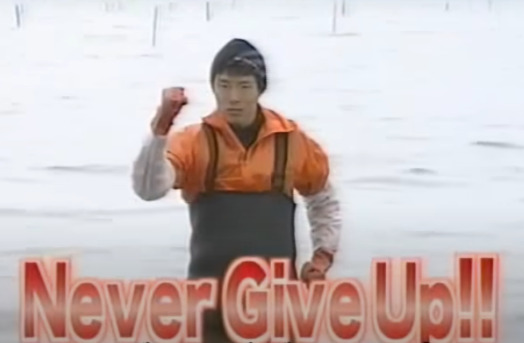
And if that fails to persuade, then you should also know that I’ll never give up on you, never let you down, never, ever going to desert you, never make you cry, never say goodbye, and never tell a lie to hurt you.
Now that I’ve strung you far along enough, here’s what I really did: I read yandere fanfiction. I’m legit pretty sure that’s the only reason my prose is this good. It is also probably responsible for 45% of my questionable thoughts. The other 55% is from the Internet. Now that I’ve told you this, here’s a favor from you to me: take this last bit of information to the grave. Mostly because typing that was just pretty funny and I am nothing if not a hedonist except when I’m not.
1 note
·
View note
Text
Academic Blog 6
Florence (2018) is an interactive story that follows the relationship between Florence Yeoh and Krish. Florence Yeoh is a Chinese-Australian woman who is tired of her monotonous life and Krish Hemrajani is a South Asian-Australian young man who plays the Cello. It is a short heartfelt story with mini-games, where the interactivity of the game enhances the narrative experience of the player.
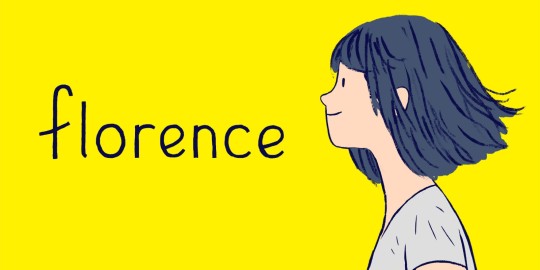
Juul (2001) claims that it’s impossible to combine narration and interactivity simultaneously and that a story that is continuously interactive doesn’t exist. Although narrative and interactivity can be considered as opposing elements, the game Florence (2018) has combined the two to create a memorable experience for the player. ‘Just as television is often more dialogue-driven than cinema, radio uses soundscapes differently than film, and composition in a painting can draw the viewer’s eye through a narrative, video games' particular affordances, and attributes likewise lend differences to the modes of storytelling.’ (Sundaram, Gottlieb, 2022, p.81) The game mechanics are pivotal in the narrative and deepen the storytelling. The player is made to play mini-games within the game that form part of Florence and Kris’s daily lives. By manipulating objects in the game, the player is made to reflect on the emotions of the characters as their relationship progresses from growing love to heartbreak. Polaroids taken by the player reveal the progress of their blossoming love and become a part of the narrative when it turns into an object for Florence to revisit as the story progresses. Even communication in the game is through speech bubbles that are like puzzles the player must match to continue the narrative. They dance and shift according to the story's tone, conveying meaning to the player.
Another aspect of the game is using an environmental narrative to normalise cultural differences and intercultural relationships. Throughout the game, there are narrative objects that signify the cultural backgrounds of the two characters. For example, sushi signifies Florence’s Asian origins and Kris’s Ganesh on his shelf signifies his religion. The game also displays objects in the environment that form a part of their identity apart from their cultural and religious origins. These characters have a distinctive personality that goes beyond being representatives of their culture. Sundaram and Gottlieb (2022) support this by saying that the game unapologetically focuses on the broader narrative and the game's emphasis on the love story told from the perspective of cultural characters traditionally seen as 'others' helps to promote the idea that intercultural relationships are normal.
Video games have a huge potential to convey stories in interesting and interactive ways without diminishing their impact. Although narrative is not necessary to make a good game, I would like to create games that convey emotions through a combination of ludology and narratology. The success of Florence (2018) in creating a poignant love story that involves the player in enhancing the narration has inspired me to create something similar. "The reader/viewer needs an emotional motivation for investing energy in the movie or book; we need a human actant to identify with. This is probably also true for the computer game, only this actant is always present - it is the player" (Juul, 2001). By utilising the player's emotional motivation, a game as heartfelt as Florence (2018) can be created.
References
Juul, J. (2001) Games Telling Stories: A brief note on game and narrative. Vol. 1, Issue 1. [Online] July, 2001. Available from : GameStudies.org http://www.gamestudies.org/0101/juul-gts/ [Accessed: 7 December 2023].
MOUNTAINS. (2018) Florence. [Video Game]. Annapurna Interactive.
[Accessed: 7 December 2023].
Nintendo (2020) H2x1_NSwitchDS_Florence_image1600w.jpg, Nintendo-Switch-games. Available at: https://www.nintendo.co.uk/Games/Nintendo-Switch-download-software/Florence-1717329.html [Accessed: 7 December 2023]
0 notes
Text
The Sheik: Part 1
Disclaimer: I don’t own Maus or any of Spiegelman’s work. I have attached the photos from the work itself, but do not claim to own the scanned version either. I highly recommend purchasing the book to support the original author. My thoughts do not represent the author's work and are merely my own interpretations.
Warning: MAUS is a graphic novel based on the author’s father’s experiences during the holocaust and includes anecdotes and scenes including violence, blood which may be considered triggering.
Introduction: The work MAUS by Art Spiegelman is a novel that tells the story of Vladek Spiegelman and his experiences during the holocaust using an allegory and parallel storylines to depict the Vladek's past and Artie's present as he hears the story from his father. This work includes an autobiographical and biographical element due to the inclusion of two main characters - Vladek and Artie. Spiegelman makes the decision to introduce himself as a character in the work as a mouthpiece for himself.
Main Characters:
Artie: The author
Vladek: Artie's father
Anja: Artie's mother
Mala: Vladek's second wife
Françoise: Artie's wife
Navigation -> The Sheik Masterlist -> Previous Part
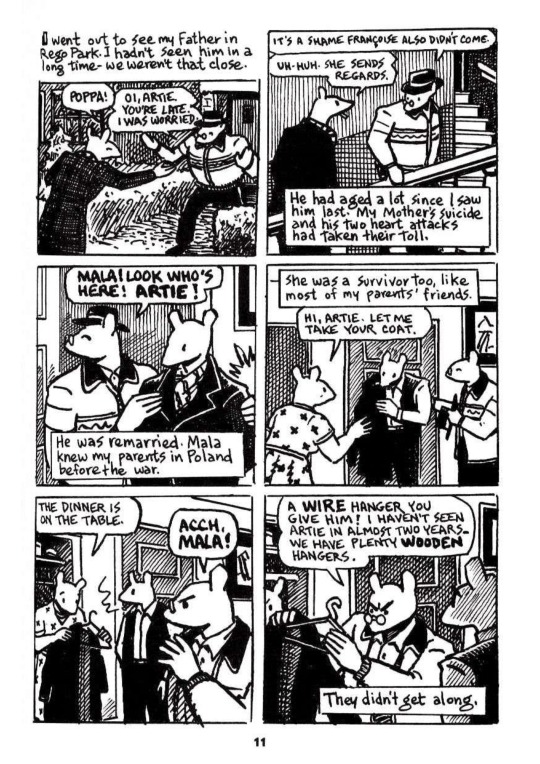
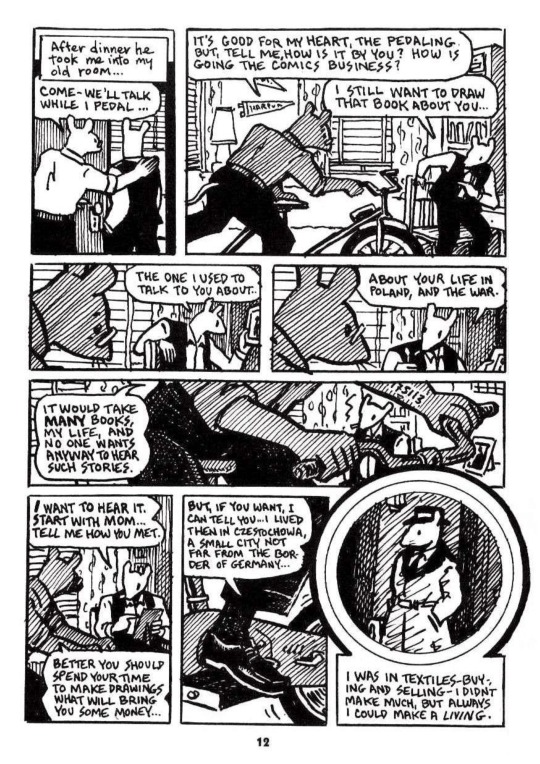
MAUS by Art Spiegelman

Points of Interest:
Narration
The start of the book begins with the present and Spiegelman establishes himself as the main storyteller in the work. The use of first person introduces his character and which then introduces his father in the panel with the dialogue 'poppa'. The idea of two main characters is communicated through the use of dual storylines, where Artie is the protagonist in the present, and Vladek is the protagonist in the past. The control of both of them over the narrative is visible in this work, and Spiegelman repeatedly establishes that this is Vladek's story told by Artie.
Hanger
Vladek's fuss over the hanger depicts his attention to detail, and also his standards of treatment to show more care and affection. The nuance of their relationship is shown here, and Vladek's retort towards Mala conveys his displeasure at Artie's treatment. His love language could be considered to be acts of affection however as we continue further in the work we will see Vladek's love can often have different effects on the receivers.
Giant Image
The panels on the second page line up to form a bigger picture of Vladek on his bicycle. This also exposes the numbers on his right hand for the first time in the book. The parts are broken up such that Artie's face falls between Vladek's hand. This denotes his entrapment by Vladek's past and how the Holocaust permeated every part of his life while growing up as seen in the prologue.
Vladek's English
Throughout the work Vladek speaks in broken english and these errors are typically readable and do not affect the flow of the story however they serve to remind the readers of his role in the narration. These errors are minute and never visible in other character's speech or the narration which informs us that it is deliberate choice by Spiegelman.
His own life story
Vladek's requests and discouragement of Artie show how he doesn't believe his life's experiences will be worth much. However this coupled with the reader's knowledge of its success and Pulitzer Prize seems very ignorant. It's common to dismiss one's achievements however Vladek is aware of the ordeal he has survived. This perspective allows Spiegelman to add Vladek's opinion on the work, and suggests to the readers that he may never have been a fan of the idea.
Photo
In the background we can see Artie picking up a photo and pointing to it while saying he wishes to learn about his Vladek's past, and this kind of background detail adds information about Vladek's house. Additionally it suggests there are still relics of his experiences in Poland that survived the holocaust.
Young Vladek's introduction
One of Spiegelman's methods of communicating ideas to his readers is by the things unsaid. For example he often exaggerates features of Vladek's stories by using hyperbolic descriptions of smaller details that may not have been directly specified. For example, he tends to heighten Vladek's protagonist power as attractive, dependable and self sufficient. This is however Vladek's own description of himself as evidenced through anecdotes of his life in the present. The first chapter features Vladek at his peak and the use of circular panel draws our attention towards him immediately. The lines used for him in the present are softer and rounded making him appear more older and frail, however the past features crisp and sharp lines that make him look very smart.

Next Part
#maus#musings-of-a-lit-student#art spiegelman#literature#analysis#writing#long post#antisemitism#holocaust#graphic novel#comics#art#illustration#books and literature#book recommendations#novel#thoughts#reading#english literature#academia#dark academia#light academia#book bans#ban#banned books#education#trending#spilled thoughts#books
1 note
·
View note
Text
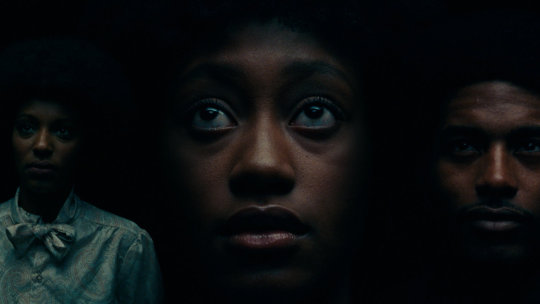
Anatomy of a Scene
The first film I watched was Moonlight, a masterclass in storytelling and pacing. It tells a realistic story of a young African American boy named Chiron, referred to by bullies as "Little" for his small stature and timid personality. It is a gritty slow-burn of a story that allows the viewer to feel as though they are along for the ride regarding Chiron's struggles and emotional journey. It chronicles three stages of his life between childhood, adolescence, and adulthood, in which he must come to terms with his identity and sexuality. The movie does an exceptional job of portraying a young, damaged soul who does not understand what makes him different from the other boys in his school. His mother is also a drug addict and mocks him for his eccentricities. He eventually meets a kind-hearted man named Juan, who shows him what having a father figure is like, albeit one who is also not perfect; he comes to learn that Juan is selling his mother the drugs enabling her habit. The film uses many close-up shots to convey the pain and emotions that each character goes through, but it also has one memorable scene that utilizes a continuous tracking shot of Chiron barreling his way through school to confront his bully. I enjoyed the movie and its thought-provoking nature of self-acceptance, confidence, and love.
The second film I chose to watch was BlacKkKlansman, which follows the first African American detective to work in the Colorado Springs Police Department in the 1970s. He comes up with a daring plan to infiltrate the local Ku Klux Klan chapter and expose them. He speaks with the president of the chapter over the phone to set in motion plans to meet and learn more about their motives while his white partner acts on his behalf in person. The movie has a dark comedic undertone that adds to the style of the film and uses unique shots to convey the message of acknowledging African American beauty and self-love. A scene that stands out as particularly effective is during the invigorating speech of Kwame Ture. He speaks of principles to eradicate racism and accept the uniqueness of every African American's facial distinction and structure compared to what the "standard" of beauty is. With the use of pan shots throughout the crowd, you can see everyone's unity in acceptance of his speech. Portrait shots are then shown to highlight the crowd's faces with the use of a dark background to accentuate the engaging nature of their pride in his words. The subtle lighting here is the key to this scene as everyone's portrait is dissolved to bring in the next member of the crowd. It is an uplifting scene that brings a dramatic realization to an otherwise comedic movie of everyone's importance toward the acceptance that they are beautiful no matter their skin color or facial structure. The lighting and close-up shots contribute to the overall description of Kwame Ture's audience members by showing what he is talking about in immaculate detail. In my opinion, this scene embodies the message of the entire movie regardless of its placement toward the beginning of the narrative.
0 notes